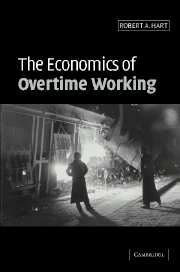Book contents
- Frontmatter
- Contents
- List of figures
- List of tables
- Preface
- 1 Overview
- 2 Facts and figures
- 3 The overtime decision
- 4 The overtime premium
- 5 Overtime hours and empirical studies
- 6 Overtime pay and empirical studies
- 7 Policy issues
- 8 Is overtime working here to stay?
- References
- Index of names
- Index of subjects
1 - Overview
Published online by Cambridge University Press: 22 September 2009
- Frontmatter
- Contents
- List of figures
- List of tables
- Preface
- 1 Overview
- 2 Facts and figures
- 3 The overtime decision
- 4 The overtime premium
- 5 Overtime hours and empirical studies
- 6 Overtime pay and empirical studies
- 7 Policy issues
- 8 Is overtime working here to stay?
- References
- Index of names
- Index of subjects
Summary
Overtime working implies that actual hours of work per period are in excess of standard contractual hours. An example of standard time is a 35-hour workweek consisting of five 7-hour weekdays. If an individual works a 50-hour week then this would entail 15 weekly hours of overtime. This may be spread over weekdays, or confined to specific weekdays or it may involve, additionally or solely, weekend work.
For the vast majority of workers, overtime hours are remunerated at a different rate of pay from standard hours. Typically they command a premium that consists of a fixed multiple of standard hourly pay. A premium of time and a half applies to most overtime workers in the United States. This means that a worker receives 50 per cent more for working an overtime hour than a standard hour equivalent. Double time, time and a quarter, time and a third are other common multiples found elsewhere. Over the week, overtime hours may not be paid at a constant premium. It is not uncommon, for example, for workers to receive a higher premium for weekend compared to weekday overtime activity. Overtime is not necessarily paid at higher rates than standard time, however. For a minority of workers, overtime hours are remunerated at the same rate or even at a reduced rate. Further, some workers are rewarded indirectly for undertaking overtime. The most common practice in this latter respect is for the firm to offer days off in lieu.
- Type
- Chapter
- Information
- The Economics of Overtime Working , pp. 1 - 10Publisher: Cambridge University PressPrint publication year: 2004



